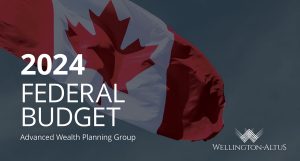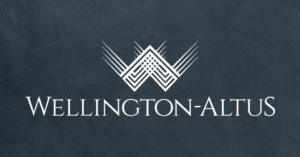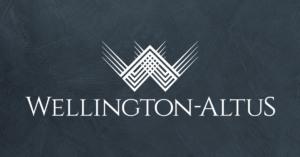In a recent national survey by FP Canada™, four-in-ten (39%) Canadians reported they do not have a financial plan. The survey also found that 35% are not confident they will achieve their financial goals.
Financial planning is a process that enables participants to set goals, consolidate financial information, analyze decision-making, and catalyzes action. Individuals with a financial plan, or who seek professional financial advice, report higher levels of confidence and less finance-related anxiety (Letkiewicz, et al., 2016).
We asked our Advanced Wealth Planning Group and Investment Advisors to share their experience by answering two questions. We’ve compiled the top 5 responses for each.
What is the most common financial regret you hear from your clients?
- I wish I had started saving and investing earlier
The earlier you begin saving and investing, the less you will need to save throughout your lifetime. This is due to the principle of compounding returns. Compounding occurs when investment earnings, whether dividends, capital gains, or interest, are reinvested to generate additional returns.
To illustrate the impact of compounding returns: An individual who wants to have an investment account valued at $1,000,000 by age 65, assuming a 5% rate of return (excluding taxes and inflation), would need to save the following amounts:
| Annual Savings | Total Savings | Account Value at 65 | |
| Starts saving at 25: | $8,278 | $331,120 | $1,000,000 |
| Starts saving at 35: | $15,051 | $451,530 | $1,000,000 |
| Starts saving at 45 | $30,243 | $604,860 | $1,000,000 |
| Starts saving at 55 | $79,505 | $795,050 | $1,000,000 |
Although it is easier to start saving early, it is never too late to start.
- I wish I had purchased insurance earlier
The fundamental purpose of life, disability, or critical illness insurance is to provide financial protection to individuals and families in the event of a worst-case scenario. It is impossible to predict the future, but adequate insurance coverage should be part of any comprehensive financial plan.
There are several benefits to purchasing life, disability, or critical illness insurance earlier in your life:
- Lower premiums
- Lower probability of being rated or uninsurable
- Protect your future or current dependents
- Potential growth within the policy
Being proactive with your insurance coverage at a younger age will provide affordable protection that will benefit your future self.
- I wish I had created a financial plan earlier
The statistics are clear: individuals with a financial plan feel more confident and prepared to achieve their financial goals than those without a plan. Not only does financial planning improve confidence, it also reduces finance-related stress.
Additional advantages of financial planning include:
- It improves emotional and mental well-being
- It provides a setting to contemplate and set financial goals
- It creates motivation and commitment
- It encourages action
- It increases the probability of achieving goals
- I wish we had structured our household finances more tax efficiently
Often, it is not until retirement arrives that individuals begin to consider decumulation strategies; that is how to draw down savings in a tax efficient manner. While a well-structured decumulation strategy in retirement is essential, this should also be considered when an individual or couple are accumulating assets.
During the accumulation phase, households should consider the following:
- Spousal RRSPs: shift retirement income from the higher income spouse to the lower income spouse.
- Income splitting: save and invest the earnings of the lower income spouse so income from investments are taxed at his/her marginal tax rate; use the earnings of the higher income spouse to pay expenses.
- I wish someone would have highlighted the importance of household finance and investing – my parents or in school
“I wish” and “earlier” are constant themes throughout this list of regrets. The fact is, many Canadians leave school or home ill-informed about basic personal finance – budgeting, debt management, income taxes, etc.
The onus is on Canadians to strengthen their own financial literacy through financial advice and financial education. There are many ways to achieve this. According to the 2019 Canadian Financial Capability Survey, Canadians seek financial information from the following sources:
- A professional financial advisor or planner (49%)
- Banks (41%)
- Internet (33%)
- Friends or family members (29%)
- Newspapers or magazines (15%)
Not all financial information or advice is equal, please reach out to your WAPW advisor as we are here to communicate, educate and translate all things financial.
What are simple tips Canadians should implement to improve their financial situation?
- Make it automatic: start a monthly contribution plan to your savings/investment account
Saving money is not always easy. It requires delaying current consumption to save for the seemingly distant future. This can be a difficult trade-off.
Automatic monthly deposits take the emotion and discipline out of savings and allow individuals to “pay themselves first”. Many Canadians who use automatic savings “never miss” the funds.
- Track spending: use a tool that makes one aware of where their money is going
Budgeting and expense tracking are complementary exercises. When it comes to managing cashflow, 17% of Canadians acknowledge their spending exceeds their income (2019 Canadian Financial Capability Survey).
Understanding spending relative to savings is a key component of any financial plan. There are a number of tools available to help Canadians track their spending. From spreadsheets to mobile apps, the method is less important than the act. If you’re having trouble saving, reviewing your expenses is a good way to identify possible savings.
- Take advantage of tax-advantaged accounts (RESPs, RRSPs, TFSAs)
A tax-advantaged savings or investment account is an account that offers some form of tax benefit, either through tax deferral or tax exemption.
In Canada, the three most common types of tax-advantaged accounts include:
- RESPs: Contributions are not tax-deductible. Income is not subject to tax, and investments within the plan grow tax-free. Educational Assistance Payments (EAPs) are taxed at the beneficiary’s marginal tax rate upon receipt.
- RRSPs: Contributions are tax-deductible to the contributor. Income is not subject to tax, and investments within the plan grow tax-free. Withdrawals are taxed at the beneficiary’s marginal tax rate.
- TFSAs: Contributions are not tax-deductible. Income is not subject to tax, and investments within the plan grow tax-free. Withdrawals are tax-free.
It is also worth noting that while non-registered accounts do not shelter income and gains from tax, certain investment income receipts are taxed at preferential tax rates, such as Canadian Dividends and Capital Gains.
- Consider delaying CPP and OAS pension benefits
Private sector defined benefit pension plans are all but extinct; leaving Canadians to bear the investment risk on their retirement assets. Government benefits, such as Old Age Security (OAS) and the Canadian Pension Plan (CPP) operate like a defined benefit pension plan: the monthly benefit is guaranteed and indexed to the Consumer Price Index (CPI), so the benefit grows with inflation.
Most Canadians start their CPP/OAS early or at the age of 65. Many would benefit from delaying their benefits. Consider the following:
- For each year you delay CPP from the age of 65 your benefit is increased by 8.4%.
- For each year you delay OAS from the age of 65 your benefit is increased by 7.2%
Name another investment vehicle that provides this rate of risk-free return.
Canadians who are healthy, and with enough savings to cover expenses during early retirement, should consider delaying CPP and OAS.
- Create a financial plan specific to their unique circumstances
An individual’s unique financial position should be considered when providing financial advice or developing a financial plan. Not all advice applies equally to all.
For example, an individual with $50,000 in taxable income should not prioritize RRSP contributions like an individual with $500,000 in taxable income.
A customized financial plan analyzes an individual’s unique financial circumstances and identifies opportunities and issues across the areas of financial planning – financial management, investment planning, risk management, income tax planning, retirement planning, estate planning – so clients can make informed financial decisions.
Please reach out to your Wellington-Altus Private Wealth advisor to discuss the benefits of financial planning further.
Wellington-Altus believes in the importance of financial literacy and embracing the role we play in supporting our clients and Canadians in this endeavour. That’s why this month, in honour of the 10th Anniversary of Financial Literacy Month, our AWPG is featuring a Q&A with WA. We’ll be sharing simple, impactful financial planning information sourced from our very own team of advisors and wealth planners on LinkedIn.
Stay tuned to our LinkedIn page as we share content to support #FLM2020 and addresses areas of financial planning.
Find an advisor at https://bit.ly/34O0Pok.
The information contained herein has been provided for information purposes only. The information does not provide financial, legal, tax or investment advice. This does not constitute a recommendation or solicitation to buy or sell securities of any kind. Market conditions may change which may impact the information contained in this document. Wellington-Altus Private Wealth Inc. (WAPW) does not guarantee the accuracy or completeness of the information contained herein, nor does WAPW assume any liability for any loss that may result from the reliance by any person upon any such information or opinions. WAPW is a member of the Canadian Investor Protection Fund and the Investment Industry Regulatory Organization of Canada.
© 2020, Wellington-Altus Private Wealth Inc. ALL RIGHTS RESERVED. NO USE OR REPRODUCTION WITHOUT PERMISSION.
https://www.wellington-altus.ca/fr
If you no longer wish to receive commercial electronic messages from Wellington-Altus Private Wealth Inc., please send an email to unsubscribe@wprivate.ca



